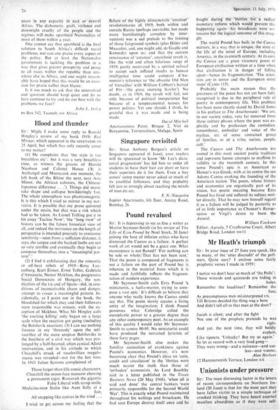Blood and thunder
Sir : Might I make some reply to Ronald Hingley's review of my book 1919: Red Mirage, which appeared in the SPECTATOR on 25 April, but which has only recently come to my notice?
(I) He complains that 'the style is too breathless etc': but it was a very breathless time, as witness • the groans of Harold Nicolson and Colonel House (It is Archangel and Murmansk one moment, the left bank or the Rhine the next, next Asia Minor, the African colonies, the Chinese- Japanese difference . . .'). Things did move, take shape and collapse bewilderingly fast. The whole atmosphere was phantasmagoric. It is this which I tried to mirror in my nar- rative. It is possible that my prose quivered under the strain, but that was a risk which had to be taken. As Lionel Trilling put it in his essay 'Tacitus Now', 'the "long view" of history can be the falsest historical view of all, and indeed the insistence on the length of perspective is intended precisely to overcome sensitivity—seen from a sufficient distance, it says, the corpse and the hacked limbs are not so very terrible and eventually they begin to compose themselves into a "meaningful pat- tern".'
(2) I find it exhilarating that the romantic or off-beat rebels of 1919z—Rosa Lux- emburg, Kurt Eisner, Ernst Toiler, Gabriele d'Annunzio, Nestor Makhno, the progressive Social Democrats of Hungary, the syn- dicalists of the us and of Spain--did, in con- ditions of inconceivable chaos and danger, attempt to create a meaningful pattern. In- cidentally, as I point out in the book, the bloodshed for which they and their followers were responsible was minute, with the ex- ception of Makhno. What Mr Hingley calls 'the exciting killing' only began on a large scale when the reaction got going (including the Bolshevik reaction). (3) I can see nothing fatuous in my `threnody' upon the self- sacrifice of the more utopian Bolsheviks in the butchery of a civil war which was pro- longed by a half-hearted, often cynical Allied intervention, and in his attitude to which Churchill's streak of vaudevillian megalo- mania was revealed—not for the last time. In 1943 Julian Symons complained of Those larger-than-life comic characters, Churchill the moon-face moocow chewing a permanent cigar, Roosevelt the gigantic False Liberal with syrup smile, Medicine-man Stalin like Aunt Sally at a fair, All snapping like canvas in the wind ...
I tried to get across my feeling that the failure of the highly idiosyncratic 'amateur' revolutionaries 'of, 1919, both within and outside Russia (perhaps inevitable, but made more humiliatingly complete by inter- vention) was a sad prelude to the foisting of those fairground symbols (plus Hitler and Mussolini, and, one might add, de Gaulle and Kennedy) upon us; and that the current renaissance of 'amateur', anarchoid revolt is, like the wild and often hilarious surge of 1919, partly motivated by a spirited refusal to accept such inflated insults to human intelligence (one could compare d'An- nunzio's reference to 'the obscene Old Men of Versailles' with William Cobbett's hatred of Pitt—`the great snorting bawler'). No doubt, as in 1919, the revolt will fail, not only because of political inexperience but because of a temperamental nausea for power politics. Yet one should, I think, be grateful that it was made and is being made.
David Mitchell Apartamentos Pator, Bloque 2, Vial de Benyamina, Torremolinos, Malaga, Spain






























 Previous page
Previous page